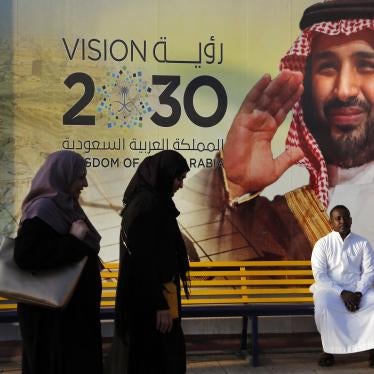(Beirut) – Saudi authorities should take further steps to end discrimination against women and fully dismantle the male guardianship system, elements of which were formally codified into the Personal Status Law adopted one year ago on International Women’s Day, eight human rights and advocacy groups, including Human Rights Watch, said today. The authorities should allow women’s rights defenders to take part in activism without fear of harassment or arrest.
Human Rights Watch and Amnesty International published analyses on International Women’s Day detailing how Saudi Arabia’s first codified Personal Status Law enshrines male guardianship over women and entrenches a system of gender-based discrimination in most aspects of family life, including marriage, divorce, and when making decisions about their children. Moreover, the new law does not adequately protect women from domestic violence.
Saudi women’s rights activists long campaigned for a codified Personal Status Law that would end discrimination against women, but the law does not reflect any input by them or other independent civil society groups as the text was not made public before it was adopted. Many prominent women’s rights defenders have faced serious government reprisal for their activism and are effectively prohibited from publicly commenting on the law.
“Without women’s rights activists’ valuable input, Saudi officials simply used the Personal Status Law to codify existing discriminatory and problematic practices against women, despite promises to the contrary,” said Lina al-Hathloul, head of monitoring and advocacy at ALQST. “Saudi Arabia’s allies and international business partners should press the Saudi authorities to amend the law and meaningfully include women’s rights activists when doing so.”
Before the codification of the Personal Status Law, Saudi judges relied on and applied their own interpretation of Islamic rulings in cases relating to personal status, which contributed to inconsistent outcomes, especially for women. Crown Prince Mohammed bin Salman and other Saudi government officials’ claimed the law helps minimize these discrepancies, but Human Rights Watch and Amnesty International’s analyses found that the law falls significantly short of international human rights standards and still leaves space for judges to exercise their discretion.
Since coming to power, Crown Prince Mohammed bin Salman, the de facto ruler, has repeatedly positioned himself on the international stage as a progressive reformer who believes women are equal to men. Saudi Arabia’s Vision 2030, which describes women as “another great asset,” says it aims to empower women.
Although there have been important reforms under bin Salman’s leadership, including giving women the right to drive and travel at age 21 without a male guardian’s permission, many of the women and other activists who campaigned for these changes, including Loujain al-Hathloul, Nassimah al-Sadah, Samar Badawi, and Mohammed al-Rabea were arbitrarily detained, banned from travel, or horrifically tortured or ill-treated in prison, including with sexual assault.
These reforms are also taking place in a context in which the space for free speech is virtually non-existent, barring public debate on key legal reforms.
Further, some of the legal amendments celebrated by Saudi government officials and their international allies for expanding certain guardianship duties more equally to women have been inconsistently applied.
“The Saudi government has fallen short of its promises to foster an environment in which women have equal rights to men,” said Heba Morayef, Amnesty International’s regional director for the Middle East and North Africa. “The government should immediately amend the discriminatory provisions in the Personal Status Law so that the male guardianship system is abolished entirely and women have equal rights and responsibilities with regards to marriage, divorce, and decisions about their children.”
The organizations are:
- ALQST
- Amnesty International
- Clearinghouse on Women's Issues
- Freedom Forward
- Freedom Initiative
- Feminist Majority Foundation
- Human Rights Watch
- MENA Rights Group








